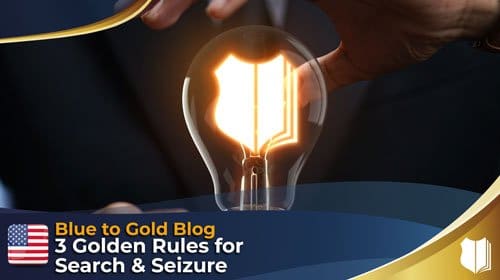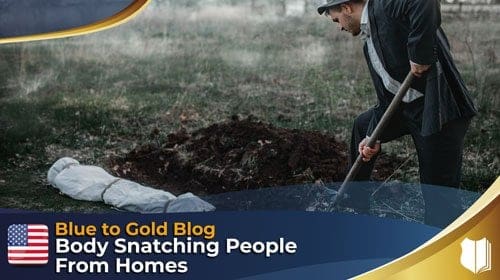

What is the Motor Vehicle Exception?
The automobile, or motor vehicle exception allows officers to search cars for evidence, contraband, and fruits or instrumentalities of crimes without a search warrant. When
or use our live chat
Customer Service


Here is a new question: Can you intersperse Miranda warnings?
Hello. My name is Anthony Bandiero, attorney and senior legal instructor for Blue to Gold Law Enforcement Training.
This question comes from one of my officers in Southern California. He says, “Anthony, let’s talk about substantial compliance with Miranda, because in order to have a valid waiver, you have to substantially comply with Miranda.”
A student was in a sexual assault Investigators class, and was told to advise in-custody suspects of their Miranda rights one at a time and fill in between them with a little bit of small talk. So for example,
“Hey, Anthony, how are you? That’s great.
“Hey, you know, you got the right to remain silent, right?
“Okay. Awesome. How’s mom? Glad to hear it.
“You also know you have the right to have an attorney present before any questioning. You get that right?
“Cool. Hey, What hobbies do you do?”
So the officer is asking me my opinion of this tactic. Well, the first thing is, I don’t think it’s per se prohibited. It’s a little unorthodox. I’ve actually never heard of a training class teaching cops to do something like this.
When you do stuff like this, you’re making case law, in a sense, so the courts have to decide whether or not it’s lawful. I do know that at the end of the day, the substantial requirement is this: did the officer articulate that the person knew their rights, and voluntarily waive them?
Well, when you have a conversation with somebody and you intersperse their rights, and especially when you ask them, “Do you understand this,” that is the knowing piece. So I don’t think it’s going to be per se prohibited. I also know that the US Supreme Court is kind of on a glide path here of kind of making things a little easier for Miranda. So I also don’t think that they would have a per se problem with this.
But we certainly want to be careful if this tactic comes off as softening up the suspect. If we can get the training materials into the court, and we can show that this officer was taught to use this tactic to soften up the suspect and to use this tactic to overcome a person’s lack of voluntary waiver, clearly, that’s going to be bad. But if the training materials, talk about how this builds rapport, how it kind of de-escalates stuff, then I think we have a fighting chance here.
So I think to me, if I was the judge, I would ask the officer, “Officer, why are you doing this?” And if the officer doesn’t have a good reason, then I think we have a problem. But if the officer says, “Hey, rapport building and de- escalation, Your Honor.” Then I can understand. Also, we’re talking about sexual assault cases. No judge that I know is going to want to suppress a valid confession from a person who commits heinous crimes like that. So we have that as well. That’s always lurking in the background.
So anyway, it’s something keep in mind. I think it’s an interesting question.
Hopefully, I’ve helped you just a little bit. Keep the questions coming.


The automobile, or motor vehicle exception allows officers to search cars for evidence, contraband, and fruits or instrumentalities of crimes without a search warrant. When


These three golden rules come from reading thousands of court cases over the last 20 years and seeing a theme regarding what the courts are


This question is: Can you look inside a woman’s purse, or a man’s backpack during a pat down? The answer is, “Maybe.” Here’s how this


Here is the question: Can an officer reach slightly into a person’s home to pull them out and arrest them? If an officer has probable
© Blue to Gold, LLC. All rights reserved